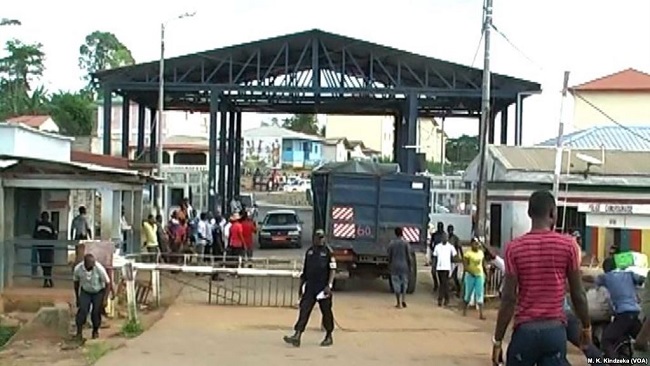French Cameroun: Traders Say Equatorial Guinea Border Closure Ahead of Elections Hurts Business
Traders in the Cameroon town of Kiossi, on the border with Equatorial Guinea, say business is suffering after the land border was closed last week ahead of November 20 elections. Equatorial Guinea says it closed the border to prevent what it calls “infiltration of mercenaries who want to destabilize the elections.” Political analysts say President Teodoro Obiang Nguema Mbasogo, who came to power in a 1979 coup and is Africa’s longest still-serving leader, is sure to win.
Several hundred citizens from Cameroon and Equatorial Guinea, most of them merchants, say they have not been able to cross the border from Kiossi, a Cameroonian border town, to Equatorial Guinea since November 3.
Dozens of heavily armed Equatorial Guinea government troops can be seen on the central African state’s side of the border.
Building material importer Dominique Essono says the troops are preventing him and many other Equatorial Guinea citizens from returning to their country to vote on November 20.
Essono said scores of businesspersons are stranded and cannot move to Cameroon from Ebebiyin, a town in Equatorial Guinea. Cameroon imports vegetable oil, wine, canned food and body lotions from Equatorial Guinea and exports building material, vegetables, tomatoes, rice and potato to Equatorial Guinea.
On October 25, Equatorial Guinea’s Vice President Teodoro Nguema Obiang Mangue said the border was sealed to prevent from the “infiltration” of groups that may want to destabilize Equatorial Guinea’s elections.
Obiang, 80, is Africa’s longest serving leader. The former military officer serving as the 2nd president of Equatorial Guinea took power in an August 1979 coup.
He will be facing two candidates in the November 20 elections.
Esono Ondo is running for the first time while Monsuy Asumu is running for the third time. Obiang told the Pan African TV Channel Afrique Media on Monday that he will continue to develop his country and reduce poverty in rural communities if reelected.
Obiang says it is by no error that continuity is the slogan of his election campaign. He says his exceptional program is to open Equatorial Guinea businesses to the rest of the world so that by 2035, the central African state can become an economically independent emerging economy.
Owona Wolfgang, a political analyst at the University of Yaounde’s political science research center in Cameroon, says Obiang is poised for another victory, as in the past six elections when he never got less than 90% of the vote.
Wolfgang says it will not be surprising if after the elections, the aging Obiang hands over leadership of Equatorial Guinea to his son, Teodoro Nguema Obiang Mangue. He says Obiang’s son is Equatorial Guinea’s vice president and a very influential member of the Democratic Party of Equatorial Guinea, the country’s ruling party.
The opposition says Obiang’s rule is marked by persecution and torture of political opponents, corruption and sham elections, charges Obiang’s party denies.
The ruling party holds 99 of the 100 seats in the outgoing National Assembly and all 55 seats in the Senate.
Equatorial Guinea’s presidential poll was initially scheduled for April 2023. President Obiang brought it forward to November 20 to coincide with legislative, senate, and local elections.
Equatorial Guinea has an annual oil revenue of more than $3 billion, but most of its 1.5 million people live in poverty according to the United Nations.
Source: VOA




